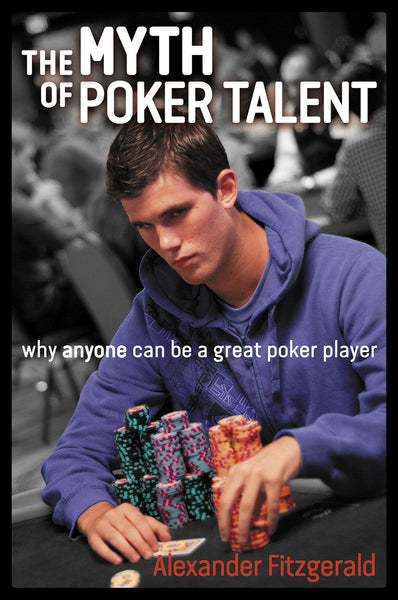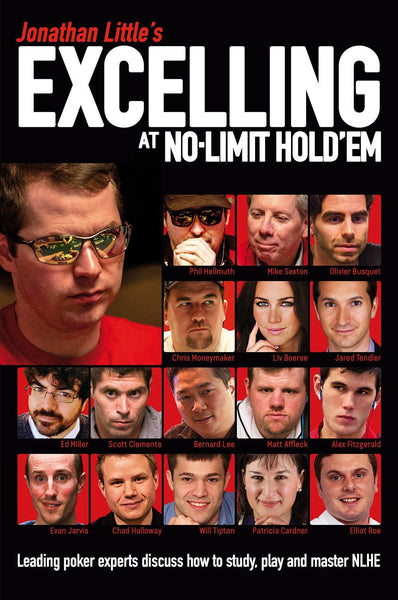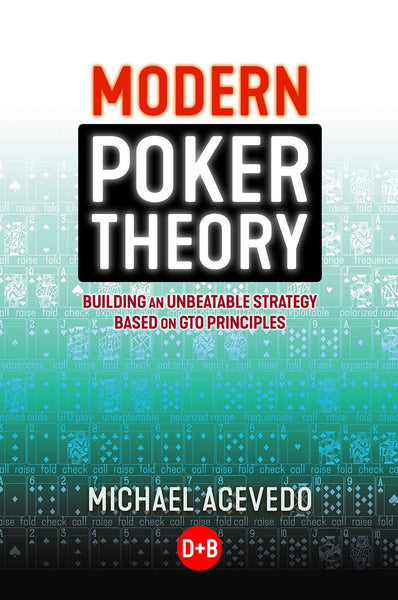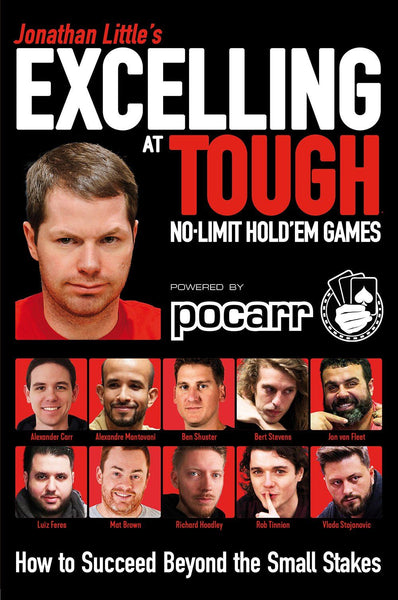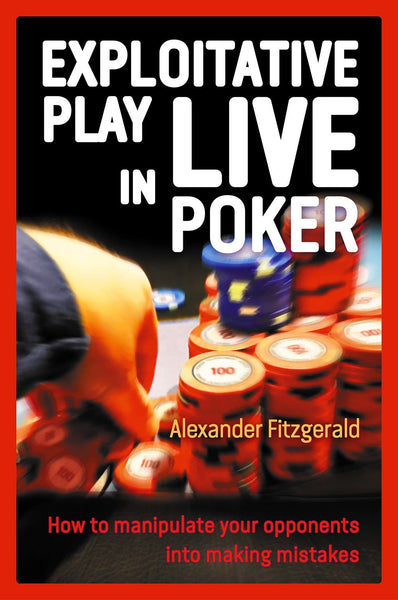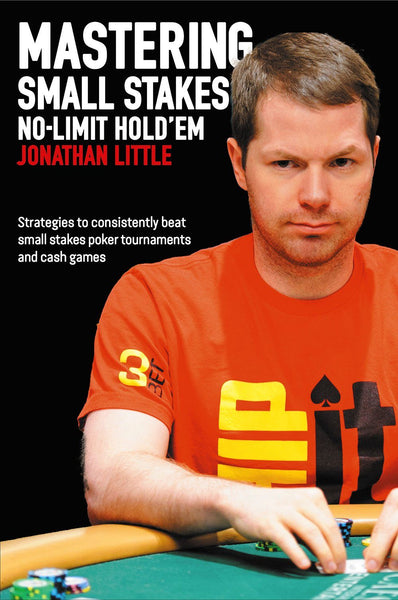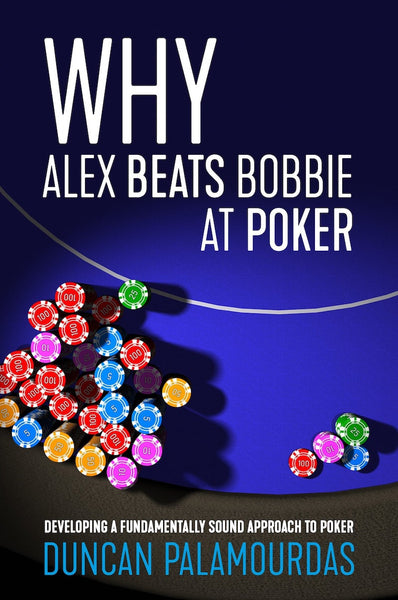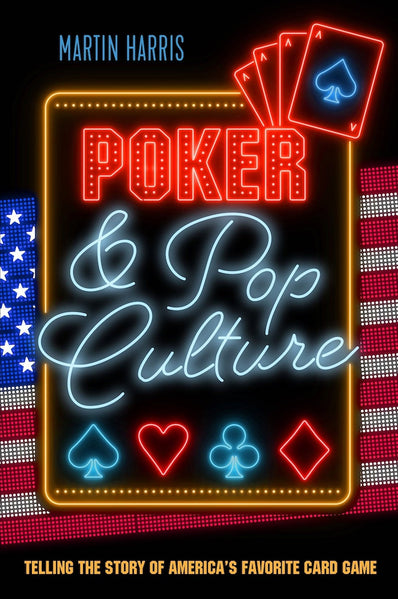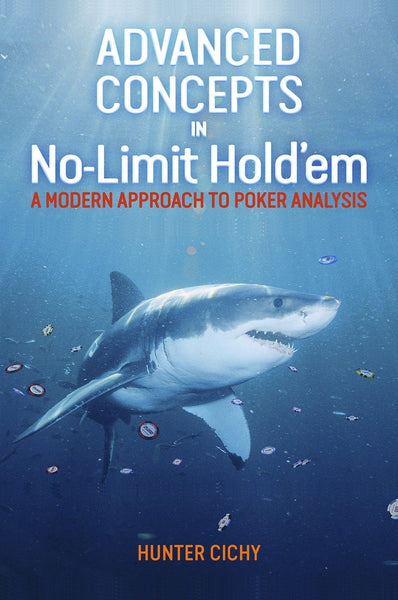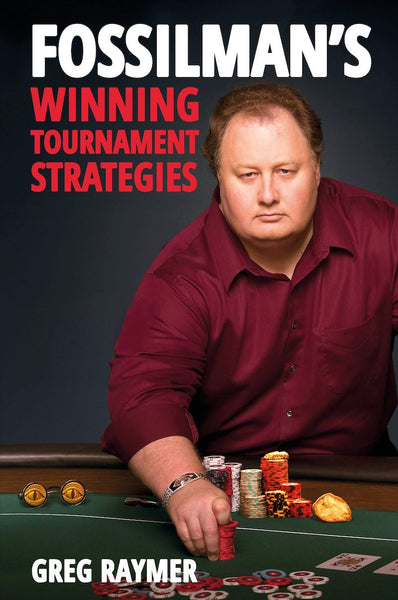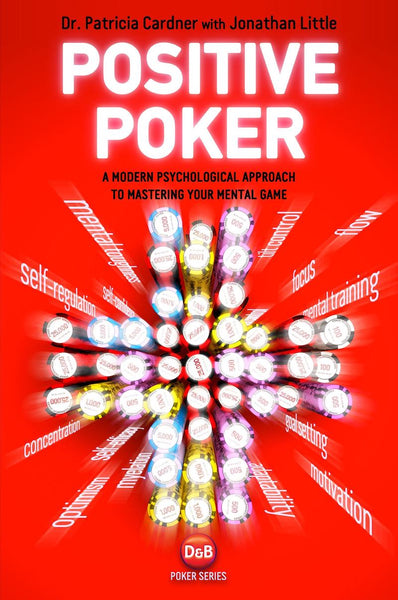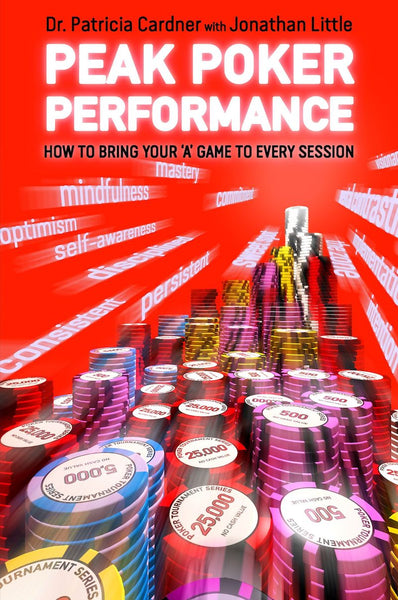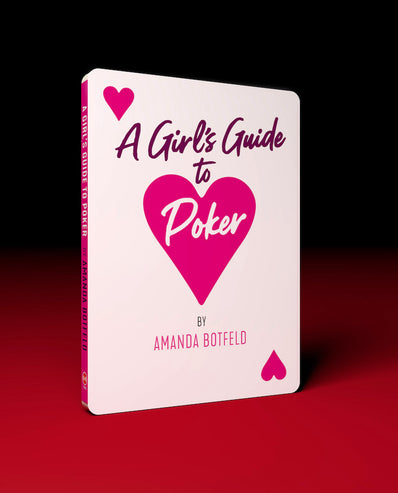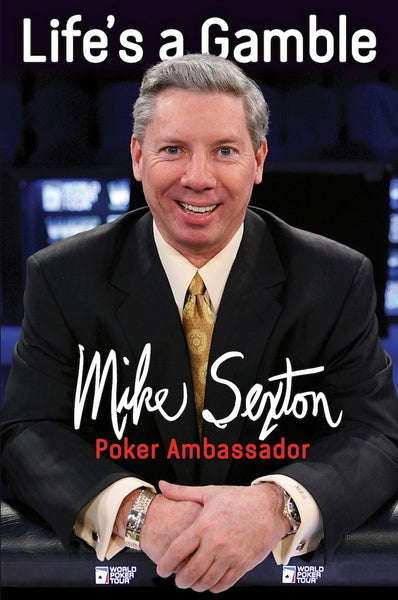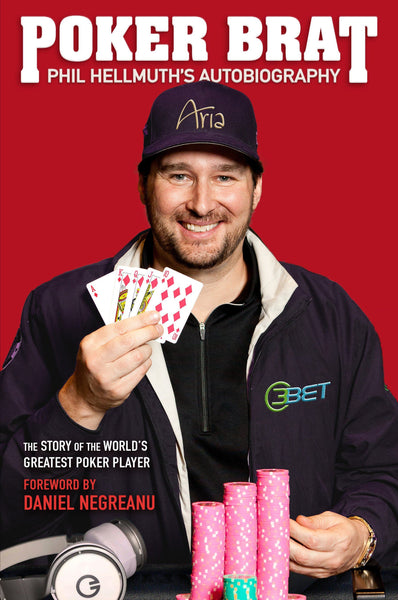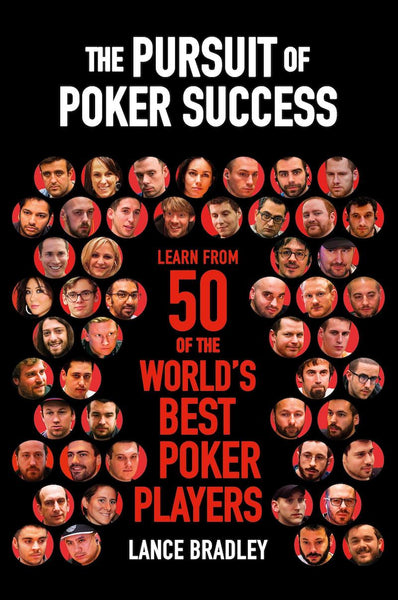Bios, Treatises & Mental Game
Learn from the best. Improve your mental game.
EXTRAS GRAPHICS FROM THE BOOK The Myth of Poker Talent is a unique book and is the culmination of renowned poker trainer Alex Fitzgerald’s work with over 1000 students over a 10 year period. Alex has discovered what makes a winning poker player and here’s the good news… It has nothing to do with poker talent. If you want to excel at the game you’ll need to buy this book, study Alex’s method and work hard – but you don’t need talent. Alex’s method focuses on understanding generic poker situations and not specific hands. As a highly experienced teacher, he expresses his ideas in simple, easy-to-understand language. The Myth of Poker Talent will teach you: A “model of poker” built from scratch An understanding of every poker tool Why much of what experienced players think they know is actually wrong. … and much, much more.
$24.95
EXTRAS Bonus Chapter Spreadsheets (20KB, XLS) GO TO HOLD’EMBOOK.COM FOR FULL DETAILS. Excelling at No-Limit Hold’em is a sensation in poker publishing. Renowned poker professional and author Jonathan Little brings together 17 of the greatest no-limit experts in the world to discuss all aspects of the game. These experts include superstars such as Phil Hellmuth, Chris Moneymaker, Mike Sexton and Jared Tendler. In Part 1 strategies are analysed for topics such as understanding the fundamentals, satellite play, lower-buy in events, analysing tells and moving up in stakes Part 2 sees a thorough technical breakdown of the game including sections on range analysis, game theory optimal play, short stack strategies, value betting and final table play. As any serious poker will confirm, the technical side is only half the battle and so Part 3 deals with mental toughness, psychology and understanding tilt. Excelling at No-Limit Hold‘em provides all the tools that an aspiring player needs to understand no-limit hold‘em. It is a must buy for anyone who is serious about wanting to improve their poker. CHAPTER DETAILS Chad Holloway - The post-boom evolution in poker Evan Jarvis - Equity, position and aggression Chris Moneymaker - Lower buy-in strategies Ed Miller – Moving up in stakes Scott Clements – General tournament concepts Matt Affleck - Advanced tournament strategies Bernard Lee – Satellite play Zachary Elwood - Understanding tells Alex Fitzgerald – In-depth range analysis Phil Hellmuth/Liv Boeree – Short stack strategies Jonathan Little - Value betting and Final table play Olivier Busquet - Heads-up play Will Tipton – Game theory optimal play Patricia Cardner – Mental toughness Jared Tendler - Eliminating tilt Elliot Roe - Poker hypnotherapy Mike Sexton – Great plays from great players
$27.95
Modern Poker Theory is a comprehensive, rigorous guide to the most important aspects of No-Limit Hold’em. It is based around an in-depth examination of what is meant by game theory optimal play (GTO) and how it can be applied at the table. Understanding GTO is fundamental to being able to make accurate poker decisions and being able to exploit players who don’t. Modern Poker Theory uses modern poker tools to develop a systematic approach to the analysis of GTO. It organizes the ideas and concepts in an intuitive manner that is totally focused to practical applications. Next time you are at a table some of the players will have studied Modern Poker Theory and some won’t. The players who have studied Modern Poker Theory will, without doubt, have a better theoretical and practical understanding of No-Limit Hold’em. They will be the favourites in the game. Make sure you are one of them. Michael Acevedo, one of the world’s leading poker theorists, is a game theory expert who is renowned for creating cutting-edge content for the world’s leading players. The production of Modern Poker Theory is the culmination of many thousands of hours of his research work with the most advanced poker software tools available. It is poker theory for the 21st century.
$29.95
Excelling at Tough No-Limit Hold’em Games is a must-have if you have ambitions to move up the stakes. Renowned poker player and leading coach Jonathan Little brings together ten No-Limit experts to provide cutting-edge information for the keen student. All the authors are established coaches for pocarr.com, the prominent backing company that features an immense private training site for backees. Pocarr has helped numerous players climb the poker ladder and succeed at the highest levels in events such as the WCOOP (World Championship of Online Poker) and SCOOP (Spring Championship of Online Poker). Success beyond the lower stakes demands a highly specific skill set. Excelling at Tough No-Limit Hold’em Games will show you how to develop this so you can rise to the top of the game. Topics include: Quick tips for beating the low stakes games Adjusting your preflop strategy When to c-bet (continuation bet) How to defend against c-bets Navigating multi-way pots Basic ICM (Independent Chip Model) and advanced ICM Medium stacked final table strategies Strategies to crush live poker Excelling at Tough No-Limit Hold’em Games is the essential guide for anyone who is serious about wanting to succeed at the high stakes and make a significant income from poker. AUTHORS: Jonathan Little Alex ‘msusyr24’ Carr Alexandre ‘Cavalito’ Mantovani Ben ‘BennyBills’ Shuster Bert ‘girafganger7’ Stevens Jon ‘apestyles’ Van Fleet Luiz ‘AcePheres’ Feres Mat ‘AussieStar’ Brown Richard ‘ChipsFool’ Hoadley Rob Tinnion Vlada ‘Vlada2108’ Stojanović
$27.95
A VIDEO INTRODUCTION BY THE AUTHOR (Click the image) Many poker players can make good decisions at the table with a reasonable frequency. Nevertheless, there are numerous situations where even very experienced players behave in predictable ways. These deeply-ingrained habits lead them to make mistakes. The problem is that these situations won’t often arise at the table by chance – you have to make them happen. Exploitative Play in Live Poker is a ground-breaking work that teaches you how to create the circumstances where your opponents will be likely to blunder and how to exploit them when they do. To achieve this you will need to put to one side starting hand charts, balance and GTO (Game Theory Optimal) play. Instead you will incorporate new concepts that may well place you outside your comfort zone. However, your style will now be forcing the other players at the table outside of their comfort zone and, unlike you, they won’t know how to adapt. Learn how to: Counter the auto-continuation-bettor Develop a powerful donk-betting strategy Use the overbet, the check-raise and the three-barrel effectively As well as being a highly successful player, Alex Fitzgerald runs a poker consultancy that serves more than 1,000 professional poker players in 60 countries. As part of this work, he has very likely trawled through more hand history databases than anyone else. This gives him a unique insight into how players really play, especially when placed under pressure and forced into unfamiliar situations.
$29.95
INTRODUCTION TO MASTERING SMALL STAKES NO-LIMIT HOLD’EM There is a lot of money to be made at small stakes no-limit hold’em because… surprise, surprise… most of the players aren’t very good. However, few players understand exactly how to exploit these games. Competent players who generally play larger stakes will, of course, beat them. But they won’t beat them for nearly as much as they ought to. Why? Because they don’t understand how to adjust correctly. Playing a solid, competent, decently aggressive style is a strategy that will be profitable. That said, you should not be content with just beating these games - you should be absolutely crushing them. The trick to doing this is to disregard a lot of “correct” poker and get way out of line at the right times. The methods required are far from obvious or intuitive but in Mastering Small Stakes No-Limit Hold’em Jonathan Little explains them in great detail. Jonathan constructs a basic strategy to crush small stakes games and also identifies the adjustments that need to be made when facing more competent opposition. You need this book if… You frequently play small stakes no-limit hold’em You usually play larger stakes but (especially live) often have to make do with smaller stakes games You play tournaments (such as WSOP events) that feature numerous recreational players
$24.95
A VIDEO CHAT WITH THE AUTHOR (Click the image) Meet Alex and Bobbie, who both like to play poker. Alex is a professional poker player who plays for a living and is a solid long-term winner. Bobbie is a recreational player who plays a decent enough game but mainly wants to have a good time. If you play poker regularly you will meet thousands of players like Bobbie in your games and very few like Alex. Of course one would expect that, in the long run, Alex will perform better than Bobbie. But have you ever wondered EXACTLY what it is that Alex understands better and does differently to Bobbie? This is a rather complex question that does not have a simple answer. In this book, UCLA maths professor Duncan Palamourdas addresses this question via a journey through human psychology, game theory, easy-to-understand mathematics and even philosophy. Topics include: Understanding the instinctive but unprofitable tendencies of inexperienced players. How to identify what a mistake actually is in poker – and how to exploit it. Why poker does not revolve around bluffing. The great impact of variance in poker and how to account for it. How to develop a consistent approach that allows you to play like Alex and not Bobbie. Duncan Palamourdas specializes in the mathematics of poker and poker education. His poker classes at UCLA always fill up early and have long waiting lists. He is also an author at Upswing Poker, Poker News, Card Player and Winning Network. Despite his impressive academic credentials, Duncan’s popularity is a product of his love for simple language and metaphors. Profitable poker play essentially revolves around correct risk-reward optimization. This is a complex topic and Duncan’s great strength is that he explains it in simple terms without resorting to technical jargon.
$19.95
A VIDEO INTRODUCTION BY THE AUTHOR (Click the image) Introduced shortly after the United States declared its independence, poker’s growth and development has paralleled that of America itself. As a gambling game with mass appeal, poker has been played by presidents and peasants, at kitchen tables and final tables, for matchsticks and millions. First came the hands, then came the stories – some true, some pure bluffs, and many in between. In Poker & Pop Culture: Telling the Story of America’s Favorite Card Game, Martin Harris shares these stories while chronicling poker’s progress from 19th-century steamboats and saloons to 21st-century virtual tables online, including: Poker on the Mississippi Poker in the Movies Poker in the Old West Poker on the Newsstand Poker in the Civil War Poker in Literature Poker on the Bookshelf Poker in Music Poker in the White House Poker on Television Poker During Wartime Poker on the Computer From Mark Twain to “Dogs Playing Poker” to W.C. Fields to John Wayne to A Streetcar Named Desire to the Cold War to Kenny Rogers to ESPN to Star Trek: The Next Generation and beyond, Poker & Pop Culture provides a comprehensive survey of cultural productions in which poker is of thematic importance, showing how the game’s portrayal in the mainstream has increased poker’s relevance to American history and shaped the way we think about the game and its significance.
$9.99
No Limit Hold’em is an extremely complex game that is difficult to learn and even more difficult to teach. Many authors have produced works on this topic which are either too simplistic or far too complex to be of any practical use. Hunter Cichy has a unique ability to present advanced concepts in a manner that any committed student can understand and implement. In this cutting-edge work, Hunter outlines a straightforward, no-nonsense approach to poker analysis. His philosophy is built around the five key elements of poker theory. pot odds implied odds pot equity fold equity minimum defense frequency. Hunter examines each of these topics in depth and explains how they interact. By combining optimal opening ranges with clear explanations of math and game theory, Hunter presents a powerful strategy that is easy to implement and difficult to exploit. A careful study of the approach outlined in Advanced Concepts in No Limit Hold‘em will undoubtedly take your game to a higher level.
$19.95
FossilMan’s Winning Tournament Strategies is the ultimate guide to practical tournament play. Greg “FossilMan” Raymer, winner of the WSOP Main Event in 2004, explains everything you need to know to become a successful tournament player. Raymer is not only a big winner at the tables, he also has a unique ability to explain difficult concepts in clear and simple language. Raymer simplfies the learning process by breaking down the complex subject of tournament strategy into the key areas. Chapters on strategy include: the Independent Chip Model (ICM), game theory, poker maths and pot odds, correct bet-sizing, playing the big stack and playing the short stack. However, Raymer does not focus merely on the correct technical aspects of standard NL tournament play. He also discusses many other important tournament formats that often confuse players. These include: how strategy changes in satellite and rebuy tournaments- how to play heads-up events and other uncommon formats and the one everyone wants to know about - how to play the Main Event.
$19.95
A VIDEO CHAT WITH THE AUTHOR (Click the image) Why are the best poker players actually the best? Every serious poker player wants to be successful and many of them have the right technical skills. However, the truth is that there are key mental factors that separate the big winners from everyone else. Patricia Cardner is a psychology professor, licensed professional counselor and dedicated poker player. She interviewed a select group of professional poker players who share two key characteristics: ALL of them have been successful over many years and ALL of them have lifetime winnings of more than $1,000,000. Patricia analyzed the results to determine exactly what psychological skills, techniques, and strategies they use. This book is the result of her studies. Positive Poker outlines the mental skills that you need to develop if you want raise your game. Positive Poker will help you to: Optimize your brain for efficient learning Increase motivation and stay positive Use psychological skills to increase your win rate Increase self-control and reduce tilt Patricia is aided in her investigations by the highly successful poker pro Jonathan Little, author of the critically acclaimed series, Secrets of Professional Tournament Poker.
$14.95
A VIDEO CHAT WITH THE AUTHOR (Click the image) Mike Sexton once asked Chip Reese, “The guys you play against are tough. What separates you from them?” Chip replied, “You’re right Mike. They are tough. In fact, when they play their ‘A’ game, I’m really no better than they are. The difference is that they also have a ‘C’ and ‘D’ game, whereas I don’t. They become weak players when they steam and just about all of them do. My edge is that I don’t steam.” (Life’s a Gamble, D&B 2016). If you’ve ever wondered if the psychological aspect of poker is important, that should provide the answer. One of the greatest players of all times is attributing his success to the fact that he has better psychological control over his play than his opponents. The good news is that, actually, there is nothing mysterious about Chip’s ability. To do the same you simply have to adhere to specific strategies and guidelines. This book will tell you what they are and explain why they work. These strategies, implemented into your everyday routine, will substantially increase your performance and improve your mental state. Peak Poker Performance will show you how to: Create an unbeatable mindset Pursue excellence during downswings Eliminate procrastination Improve your motivation Master your emotions Plus much, much more. Dr. Patricia Cardner has worked with hundreds of poker players, at mid-stakes and high-stakes levels, both through private coaching and online training. With the help of Jonathan Little, Patricia moves on from her first book, ‘Positive Poker’ and uses the very latest research to take you to the next level so you too can achieve better results on the felt and in life.
$14.95
So you want to play poker. Maybe it’s the challenge. Maybe it’s the cash. Maybe you’re turned on by guys in hoodies and sunglasses. Whatever the reason, if you’re a girl – or guy! – who wants to learn poker, then this book is handier than your high school cheat sheet. Learn everything from insider poker lingo (bluff! checkraise! snapcall!) to fancy winning plays with the help of easy-to-read mini-chapters and quizzes. Most poker books read like a math textbook. This one reads like Cosmo. The only poker book that teaches card playing strategy and how to bluff your boyfriend, A Girl’s Guide to Poker will make you the belle of the ball – or the cardshark of the casino. Amanda Botfeld isn’t your average poker player – how many hold their cards with a red nail polish manicure? Not enough! Nicknamed the Bridget Jones of poker, she seeks to turn the tables for women everywhere, writing a sassy how-to guide so more women can join the game. A writer at heart, her work has previously been published in the Wall Street Journal, Los Angeles Times, and Huffington Post.
$9.99
MIKE SEXTON READS FROM HIS AUTOBIOGRAPHY (Click the image) In his four decades as a poker professional, Mike has excelled as a poker player, poker businessman and poker ambassador. He was instrumental in the creation of PartyPoker in 2001 and was a key player in the launch of the World Poker Tour in 2002, an event that changed the world of poker forever. He has been a commentator on the WPT, along with Vince Van Patten, since its inception. He is a World Series of Poker (WSOP) bracelet winner. Mike was recognized as poker’s Top Ambassador at the Card Player Magazine Player of the Year Awards gala in 2006. That same year, he won the World Series of Poker Tournament of Champions, collecting $1 million in prize money – half of which he donated to charity. In this book Mike recounts his personal experiences and gives his take on some of poker’s legendary characters over the past 40 years. If you enjoy poker, are fascinated by the evolution of the game and enjoy compelling poker, golf and gambling adventures, then you’ll love Life’s A Gamble.
$9.99
Chris Moorman is the most successful online poker tournament player in history. Leads the industry with more than $11 million in online cashes Excels on the tournament circuit with over $4 million in live cashes Placed in the top three in online tournaments 651 times to date Many strong poker players have written books explaining their thought processes. However, players at the low- to mid-stakes who want to advance to the highest levels find the leap a daunting one. Chris, through years of hard work, has achieved this advance and now wants to help you do the same. Moorman’s Book of Poker has a unique approach. Chris analyzes 80 tournament hand histories played by co-author Byron Jacobs – a typical mid-stakes player. The adoption of a coaching format allows Chris to explain in clear detail exactly what is needed to progress to the next level of expertise. CHRIS'S PREVIOUS BOOK CAN BE FOUND HERE: MOORMAN'S BOOK OF POKER Please note: In the extract we say Chris is all the time PocketFives Triple Crown leader. A Triple Crown. A full explanation can found on the PocketFives website, but basically the PocketFives Triple Crown winner is the latest person to win three different tournaments on three different sites over the course of one week (any seven day period).
$19.95
A VIDEO CHAT WITH THE AUTHOR (Click the image) If you know Phil Hellmuth then you either love him or hate him! His rants, tirades, and lines like “I can dodge bullets baby” and “If it weren’t for luck, I’d win them all” are epic and have earned him the nickname the “Poker Brat.” However, whether you love him or hate him, he is undoubtedly the greatest poker player of our time. Phil is a global poker icon who holds every record at the World Series of Poker, including an extraordinary 14 world championships. In Poker Brat Phil paints a picture of his early Midwestern life, in which he struggled mightily in grade school and high school, but always had aspirations to do something great. Phil takes you from the low lows of his life to the high highs, and shows you how he developed an unhealthy ego along the way, which eventually turned into his “poker brat” persona. In Poker Brat, Phil shares his own powerful tips and techniques, the ones that he used to set his goals, and then he shows how he achieved those goals as he climbed to the summit of the poker world.
$9.99
Why do some poker players become immensely successful while others fall by the wayside? What is it that separates the successes from the failures? Is there a magic formula? Over the last 12 years, Lance Bradley has been one of poker’s leading journalists and now finds himself at the helm of PocketFives.com as President and Editor-in-Chief. During his time covering the poker world, Bradley has interviewed hundreds, if not thousands, of the world’s best players. This experience has revealed one fascinating trend; contrary to what might be expected, there is no single guaranteed path to success. Each and every poker player featured in The Pursuit of Poker Success has taken their own route to becoming one of the world’s best players. The players interviewed for this book include World Series of Poker bracelet winners, World Poker Tour champions, online poker wizards and some of the best cash game players on the planet. Bradley spoke to each player about the way in which they found success in a game that can be humbling for so many. What worked for them can work for you.
$9.99
(Disponible en epub seulement)Dans ses quatre décennies comme joueur de poker professionnel, Mike a excellé en tant que joueur de poker, homme d’affaires dans le poker et ambassadeur du poker. En 2001, il a été crucial dans la création de partypoker et en 2002, il a joué un rôle déterminant dans le lancement du World Poker Tour, un événement qui a changé le monde du poker pour toujours. Depuis ses débuts télévisés, il a commenté le WPT en compagnie de Vince Van Patten.En 2006, Mike a été récompensé comme ambassadeur numéro 1 du poker lors du gala du Card Player Magazine Player Of The Year Awards. Cette même année, il a remporté le Tournament of Champions des World Series of Poker pour un gain de 1 millions $ - dont il a donné la moitié à des associations caritatives. Dans ce livre Mike se souvient de ses expériences personnelles et propose une revue de quelques-uns des personnages légendaires du monde du poker de ces 40 dernières années. Si vous appréciez le poker, si vous êtes fasciné par l’évolution du jeu et si vous aimez en savoir plus sur le monde du poker, du golf et de la flambe, alors vous adorerez La Vie est un Pari.
$9.99
The World’s Greatest Gambling Scams details the best scams ever pulled off in the adrenaline-fuelled gambling world. They range from those relying on basic sleight-of-hand manoeuvres to those that utilise gadgets based on the very latest high-tech wizardry, including: the famous Ritz Roulette Scam that used mini-computers and cell phones to determine on what number the roulette ball would drop big-action baccarat games in which the dealers merely pretended to shuffle the cards a dye solution for marking casino cards that can only be seen with special contact lenses and disappears without trace an hour after its application a tiny weightless receiver embedded into a roulette ball and controlled by a radio transmitter hidden in a pack of Marlboro cigarettes. Richard Marcus is from New York and has appeared on television in the US as an expert on gambling scams. He appeared in the UK on the Challenge TV series on gambling scams and has also had a successful career as casino cheat which he detailed in American Roulette and Great Casino Heist. As well as describing the scams from their inception to implementation, Marcus introduces us to the vastly diverse characters who carried them out and analyses what made them tick.
$17.95
Princes of Darkness delves into the murky and secretive world of the professional Blackjack player. In a three-year period, Carl Sampson and his team took the casinos for a seven-figure sum and now he reveals how they did it. Carl Sampson started out working a croupier in the gaming industry but - frustrated at being overlooked for promotion - he determined to take them on and beat them at their own game. Princes of Darkness recounts the story of how he developed a system, put a team together, found a wealthy backer and went to work. As well as giving the reader a glimpse of this fascinating twilight world, Carl Sampson also explains in detail his Blackjack systems, including: A definitive guide to card counting How to master the complex art of shuffle tracking How to implement evasion techniques
$17.95

